Help Comes from Them
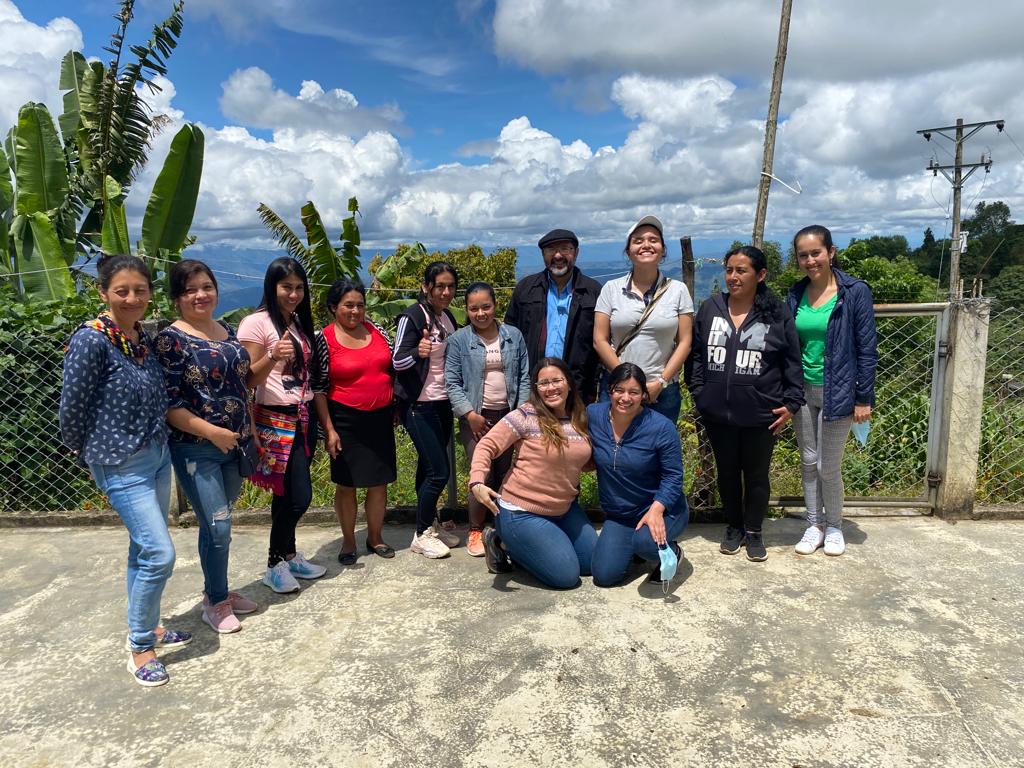
“I lift up my eyes to the mountains—
where does my help come from?”
-Psalm 121.1
In her life, Aura Alina Domínguez Chauza has had three names. Her mother called her Aura Elina, but the priest in her town registered her as Aura Alina. However, the community of Los Pinos in the municipality of San Lorenzo in the department of Nariño, calls her Auralina. That is the most recent update of her name. Her house is a huge cream and terracotta rectangle that watches over the country road from a hill. In the distance, on the plain of the Pan de Azúcar hill, a chapel can be seen, like a small light bulb. There, a long time ago, a very sick man, having asked the Virgin Mary for her health, was healed. The people, in pilgrimage, began to frequent the hill and ended up building a temple. Similarly, Auralina is one of our contacts for a new project for rural women who stand for peace and sustainability. Her house would easily seem like a temple, and we, as pilgrims.
Near her house among the mountains of the Colombian Massif, the freshwater of four Colombian arterial rivers is born. The live currents of the Magdalena River, the Cauca River, the Patía River, and the Caquetá River circulate between fields of corn, potatoes, fruit, and grains that enjoy the wind at 2,527 meters above sea level. In that portion of the Andes mountain range, when one raises one’s eyes to the mountains, help is glimpsed in that horizon of stones, vegetation, water, and in the people who work on it.
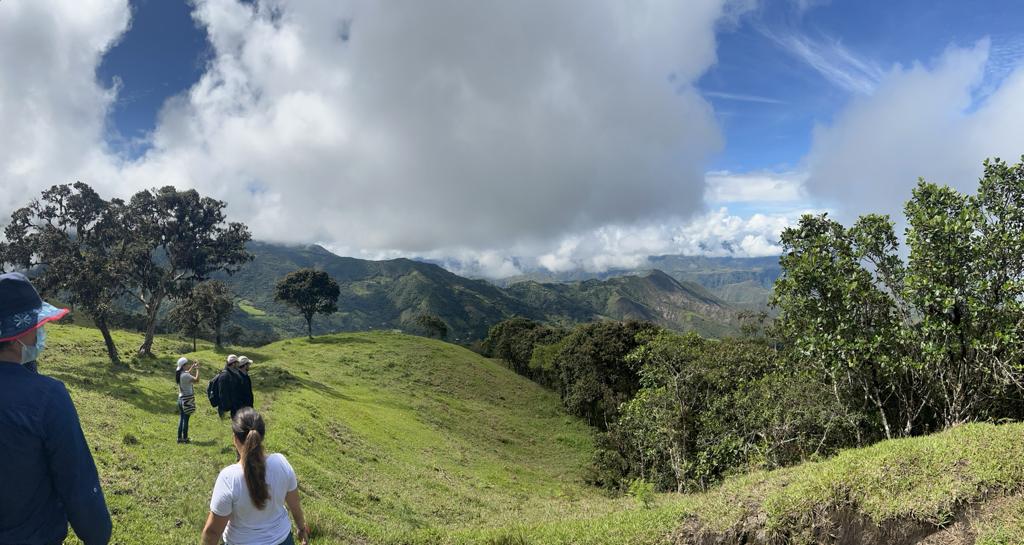
A few years ago, maybe before the Peace Accord, armed groups flanked the slopes of the Massif. But still today, on one side of the road, we are greeted by graffiti with the names of the armed fronts. On the other, there is silence, dirt roads, fields, and people with tired faces. They asked for coffee and arepas in the cafeterias at 7 am when they are not yet ready to receive customers. On one side of the hills and mountains, the coca bushes encircle the land; on the other, rural women, resolved for peace, resist violence with ancestral seeds.
Justapaz´s task is to start an agricultural project with women victims of the conflict in the region, sisters from the Pentecostal ecclesial sector, and farmworker women, participants of the social ministry of the Catholic Church. The idea is that local women generate social changes in the bowels of a patriarchal farmworkers’ culture through nonviolent actions. That was stipulated in the project with which Global Ministries and Week of Compassion would partner with Justapaz in this community. The difficult part of all this is to resist identifying immediate solutions to problems or developing agendas or possible contents for the project. Instead, our challenge is to search for and discern the ‘strategic who’ of the community. A person or group capable of creating links between communities and people. Because community networks and social changes do not begin with their ends, resolutions, or means but with their relationships. Jean Paul Lederach believed that the key question for this exercise is not the solution to this problem but, “Who has the possibility of being in relationship with the top leaders and at the same time with organic relationships, with people of communities? … Who can go from their identity group of origin, crossing the invisible social dividing line, entering into relationships with people on the other side, and coming back?” This is not easy. It takes time, a lot of time, and sometimes all this altitude.
We arrived at Auralina’s farm thanks to the “Red de Guardianes de la Semilla” (Guardians of Seeds of Life Network) and the “Asociación Agroecológica Nuevas Raíces”- Agroeconur (New Roots Agroecological Association), an agricultural organization dedicated to rescuing native and “criolla” seeds lost by the multinationals that first explore and then exploit their lands. Water, seed, and peace are their watchword. They have been at this for more than 20 years.
“It’s a hobby,” says Alba Portillo, one of Agroeconur´s representatives for the project.
“Everything in life is hobbies… over 20 years old hobbies,” Auralina responds, laughing.
Auralina had studied economics, public administration, traditional Chinese medicine, pedagogical processes, and at some point she even organized, coordinated, and directed women’s basketball teams in her region. It was not leadership that grew out of chance. Callings in life that seem like gifts to bring communities to maturity. Her community had already decided it would be GMO-free, and now they were working on their gender policy.
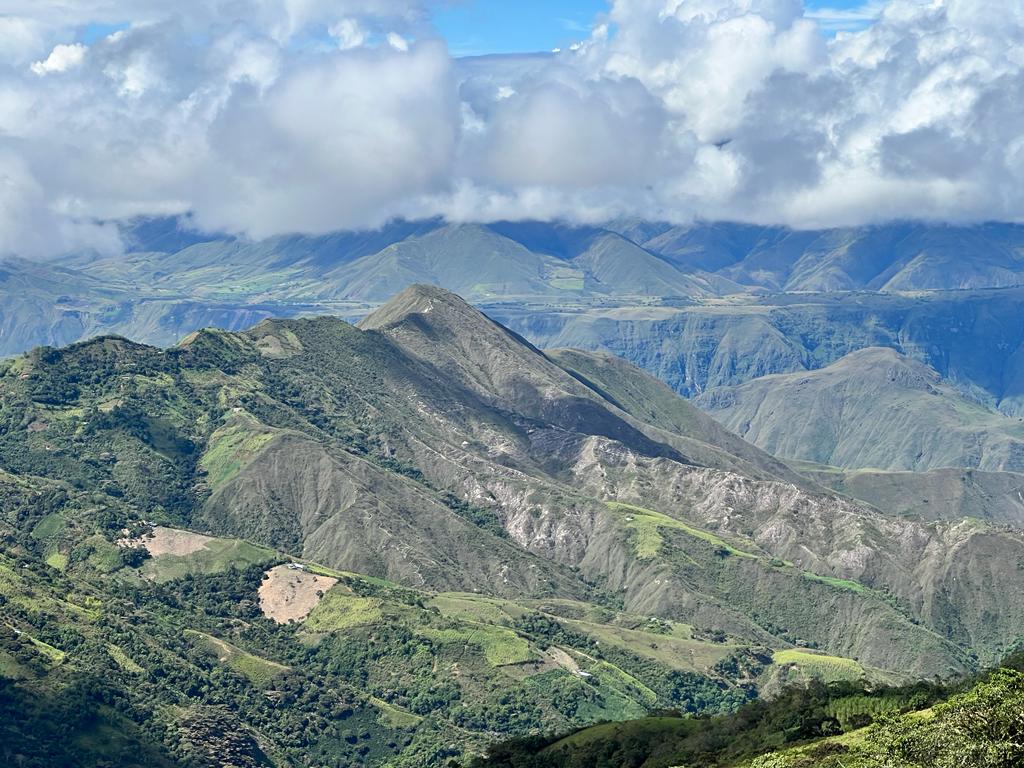
For them, the “campesino” (farmer) is from the Andes, and their seeds are only part of the path to food, they said, recalling the study by the Colombian sociologist Fals Borda. “The soil, the sun, the water, the forest, the seed… are life. Peace then is not an agreement but the daily life of a process that begins in the first territory, that is, the body. And the body was in very bad shape because people do not eat healthily,” they pointed out. Auralina knew it firsthand. Some time ago, she participated in a study for the Ministry of Health that showed a more significant pathology in women and investigated the data. “If women get sick, families don’t run.” That was the clear balance of the patriarchal structures in the municipality. “The health of the body,” she maintained, “depends on its diet. Still, vegetables do not reach all the reality of the body and the territory. We nurture ourselves by cultivating our relationships with the spiritual, the terrestrial, and the human areas of life,” she said. Humanity does not live on bread alone.
The vicinity is called “Los Pinos” (Pine trees), but there aren’t too many. Yet there are roads uphill, mud, mud channels, enormous trees, daisies the size of a hand, and the holy mystery of any mountain range in this country. As we climb, Auralina exhorts us to stop and acknowledge the welcoming of the forest spirits.
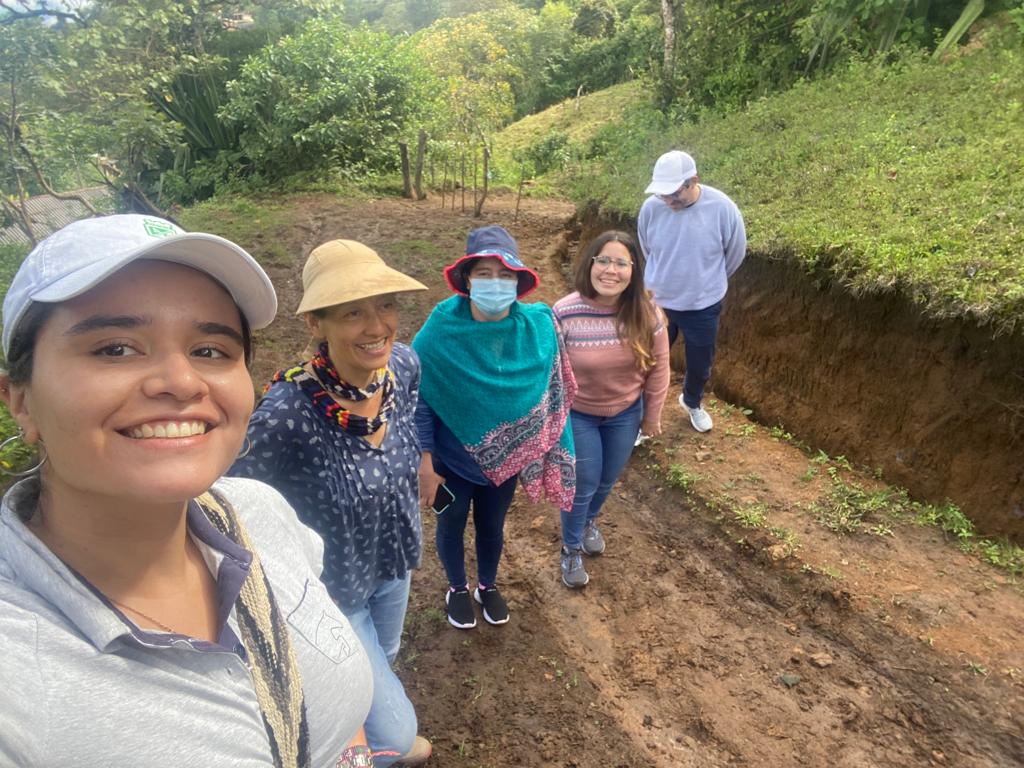
After a walk of almost 5 km at that height, we crossed the last gate of sticks and wire. It was the fourth or the sixth. To the right of the road was the thin sound of a water hole. “It takes years to sow the water, to recover it, and for it to be born again,” she told us proudly. Multinationals have other reasons to sow the water. They filled places where there was no water to later build hydroelectric plants that the slopes of the mountains and the arms of the river could not tolerate. The earth trembles and the river is compressed in diversions created by a battalion of engineers. Both the earth and the river remain solely responsible. This was in Ituango, Antioquia, in the north of the country, between April and May 2018. The brothers and sisters from churches there told us about the evictions.
“This is my sanctuary,” Auralina told us, ushering us in, going down to an open space in the forest that felt like a tabernacle of plants. It was a sacred esplanade between the mountains with a half-made octagonal structure on the land she inherited from her parents. She baptized it as “Casaútero” (Wombhouse), an octagon in clay to have community encounters and dialogue: “Here we meet and have conversations about agroecology, about how to organize ourselves as women, and about the territory,” she commented. Until then, even women with processes in the social pastoral of the Catholic Church arrived. The idea was to get the Pentecostal church to join these organizational processes as well. That is Justapaz´s bet.
It was almost 11:30 am when we returned to Auralina’s house. Two groups of women, hot chocolate, and cheese were waiting on the terrace for us. The expectation was to start the project with them. One of the groups called itself “Raíces de mi Tierra” (Our Land Roots); the other, “Desarrollo Juvenil Campesino” (Young Farmers´ Development). “We started as young women, but our name has already worn off,” they joked. They also recognized and celebrated the time spent with their community, their orchards, gardens, and their children. The growth of a solidarity economy through savings groups allowed them to work on a savings habit. “We do activities to raise funds, to get outside the logic of banks and support each other. Every microloan made is paid every month at low interest,” they showed us. They labor the land for their sustenance and not just for profit. Each one harvests their own organic crops to remove all the chemicals for the damage it does to the body. They harvest happily “because the land does not grow in a bad mood… if you’re not happy, farming doesn’t happen,” they comment. We asked them what else they did when they weren’t out among the crops and the community. “Play basketball,” they answered almost in one voice.
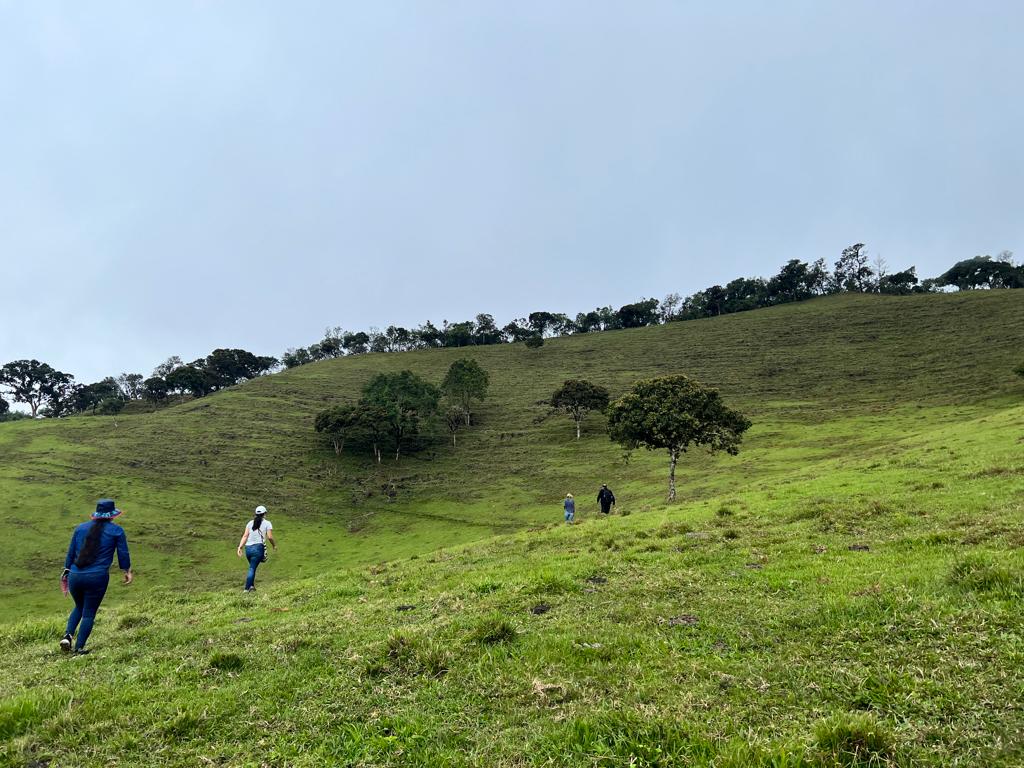
Upon returning, we remembered the reports at the end of the year by different organizations that sentenced a very hard time for human rights defenders and social leaders in the country. These are devastating figures about the risks to life that roam Colombian towns and community leaders like these women from San Lorenzo, Nariño. 171 community leaders were assassinated in 2021. There are 22 so far between January and mid-February 2022. Since the signing of the Peace Agreement in 2016, there have been 500. As of September 2021, 611 leaders and defenders of the environment were murdered. They were Indians, farmers, Afro-descendants, environmentalists, members of “Junta de Acción Comunal” (Community Action Boards), custodians and guardians of their territories who “walked with God and disappeared” (Deut. 5.24).
Auralina and these women are land workers and leaders who protect the world regardless of data. Like the mountains of some psalms, they welcome the people and listen carefully to their call for help. By listening to their stories and disposition, one realizes and sees the world organizing itself to continue being the world and not a mere resource for oil, mining, hydroelectric incomes, and monocultures. It continues to be a mountain range, rivers, and a seam of trees on which “birds come and perch in its branches” in high-altitude towns. (Mt. 13.32)
Help also comes from them.
Alex Maldonado-Lizardi and Xiomara Cintron-Garcia serve with Justapaz in Colombia. Their appointments are made possible by gifts to the Disciples Mission Fund, Our Church’s Wider Mission, and your special gifts.
Make a gift that supports the work of Alex and Xiomara
En Español
“Levanto mis ojos a los montes
¿De dónde vendrá el auxilio?”
-Salmo 121.1
En su vida, Aura Alina Domínguez Chauza ha tenido tres nombres. Su mamá la llamó Aura Elina, pero el cura del pueblo la inscribió como Aura Alina. No obstante, la comunidad de la vereda los Pinos del municipio de San Lorenzo en el departamento de Nariño, la llama Auralina. Esa es la actualización más reciente. Su casa es un rectángulo enorme de colores crema y terracota que vigila la carretera rural desde un cerro. A lo lejos, sobre la planicie del cerro Pan de Azúcar, se aprecia, como una bombilla pequeña, una capilla. Hace mucho, un señor muy enfermo, habiéndole pedido a la virgen por su salud, quedó sano. La gente, en romería, empezó a frecuentar el cerro y acabaron haciendo un templo. De igual forma, Auralina es uno de nuestros contactos para un nuevo proyecto de mujeres rurales por la paz y el desarrollo, por la paz y la sostenibilidad, y su casa con facilidad parecería un templo, y nosotros peregrinos.
El agua dulce de 4 ríos arteriales colombianos nace en las inmediaciones de su casa entre los montes del Macizo Colombiano. Por allí circulan las corrientes vivas del río Magdalena, del río Cauca, el Patía y el Caquetá, entre sembradíos de maíz, papa, fruta y granos que disfrutan del viento a 2,527 metros sobre el nivel del mar. En ese pedazo de la cordillera de los andes, cuando uno levanta los ojos a los montes, el auxilio se vislumbra en ese horizonte de piedras, vegetación y agua, y en la gente que trabaja sobre él.
Hace unos años, grupos armados flanqueaban las laderas del Macizo. Aun hoy, a un lado de la carretera nos reciben grafitis con los nombres de los frentes armados; al otro, hay silencio, caminos de tierra, sembradíos, gente de rostro cansado pidiendo tintos y arepas en las cafeterías a las 7 am cuando todavía no están listas para recibir clientes. De un lado de las colinas y montes, atrechan los arbustos de coca; al otro, mujeres rurales, resueltas por la paz, optaron por semillas ancestrales y desde ahí resistir.
Nuestra tarea consiste en iniciar un proyecto de trabajo comunitario-agrícola con mujeres víctimas del conflicto en la región, hermanas del sector eclesial pentecostal y mujeres campesinas, beneficiarias de la pastoral social de la iglesia católica. La idea es que mujeres de la localidad generen cambios sociales desde acciones noviolentas en las entrañas de una cultura campesina patriarcal. Eso era lo que estipulaba el proyecto con el cual Ministerios Globales y “Week of Compassion” acompañan la gestión de Justapaz en esta comunidad. Lo difícil de todo esto es no desesperarse por identificar soluciones inmediatas a los problemas, ni por el desarrollo de agendas o contenidos posibles para los proyectos. En cambio, corresponde buscar e identificar el ‘quién estratégico’ de la comunidad. Una persona o colectivo capaz de crear vínculos. Porque las redes comunitarias y los cambios sociales no comienzan por sus fines sino por sus relaciones. Así, planteaba Jean Paul Lederach, que la pregunta clave para este ejercicio no es entonces cuál es la solución a este problema sino, “¿Quién tiene la posibilidad de estar en relación con los máximos líderes y al mismo tiempo con relaciones orgánicas, con personas de comunidades? … ¿Quién es capaz de ir desde su grupo de identidad, de origen, cruzar la frontera divisoria social invisible, entrar en relación con personas del otro lado y volver?” Esto no es sencillo. Toma tiempo, mucho tiempo, y a veces, toda esta altura.
Llegamos a la finca de Auralina gracias a la Red de Guardianes de Semillas de Vida. Una organización de carácter agrícola en la que participan campesinos dedicados al rescate de sus semillas nativas y criollas echadas a pérdida por las multinacionales que primero exploran y luego explotan sus tierras. Agua, semilla y paz, es su consigna. Llevan más de 20 años en esto.
-Es un hobbie, dice Alba Portillo representante de Agroeconur para el proyecto.
-Todo en la vida son hobbies… de más de 20 años”, contesta riendo Auralina.
Auralina había estudiado economía, administración pública, medicina tradicional china, procesos pedagógicos, y en algún momento hasta organizó, coordinó y dirigió equipos de baloncesto femenino en su región. No era un liderazgo resultado del azar. Hay oficios que parecen regalos para llevar comunidades a la madurez. De hecho, su comunidad ya había decidido que sería libre de transgénicos y trabajaban sobre la política pública de género.
Tienen temas muy claros y compartían sus reflexiones con nosotros. El campesino es de los andes y sus semillas son solo una parte del camino al alimento, decían recordando el estudio del sociólogo colombiano Fals Borda. “El suelo, el sol, el agua, el bosque, la semilla… son la vida. La paz entonces no es un acuerdo sino la cotidianidad de un proceso que comienza en el primer territorio que es el cuerpo. Y el cuerpo andaba muy mal, porque la gente no come saludable”, señalaban. Auralina lo sabía de primera mano. Hace un tiempo participó en un estudio para el ministerio de salud que arrojó una mayor patología en mujeres y andaba investigando los datos. “Si las mujeres se enferman, las familias no corren”. Ese era el saldo claro de las estructuras patriarcales en el municipio. “La salud del cuerpo- sostuvo- depende de su alimentación, pero las verduras no alcanzan toda la realidad del cuerpo y el territorio. Nos nutrimos en el cultivo de nuestras relaciones para con lo celeste, lo terrestre y lo humano”, decía. No solo de pan vive la humanidad.
La vereda se llama Los Pinos, pero no hay demasiados. Lo que sí hay son caminos cerro arriba, fango, canales de barro, árboles enormes, margaritas del tamaño de una mano y los secretos de cualquier cordillera en este país. Mientras subimos, Auralina nos exhorta a detenernos y a reconocer la bienvenida de los espíritus del bosque.
Tras una caminata de casi 5km sobre esa altura, cruzamos un último portón de palos y alambre. Era el cuarto o el sexto. A la derecha se escuchaba el delgado sonido de un ojo de agua. “Toma años sembrar el agua para recuperarla y que vuelva a nacer”, nos decía orgullosa. Las multinacionales tienen otras razones para sembrar el agua. Llenan lugares donde no había para luego armar hidroeléctricas que las laderas de las montañas y los brazos del río no toleran. La tierra tiembla, el río se comprime en los desvíos que crearon para ellos y ambos quedan como únicos responsables. Esto fue en Ituango, Antioquia, al norte del país, entre abril y mayo de 2018. Los hermanos de iglesias allá nos contaron sobre los desalojos.
“Este es mi santuario”, nos decía Auralina haciéndonos pasar, bajando hacia un lugar abierto entre el bosque que se sentía como una capilla de plantas. Era una explanada sagrada entre las montañas con una estructura octagonal a medio hacer en el terreno que heredó de sus padres. La bautizó como Casaútero, un octágono en barro para el encuentro y diálogo comunitario: “Acá nos reunimos y tenemos conversaciones sobre agroecología, sobre cómo organizarnos como mujeres, sobre el territorio…”, comentaba. Hasta acá llegan incluso mujeres con procesos en la pastoral social de la iglesia católica. La idea era lograr que de la iglesia pentecostal también se vincularan a estos procesos organizativos. Esa es la apuesta.
Eran casi las 11:00 am cuando regresamos a la casa de Auralina. En la terraza aguardaban dos colectivos de mujeres, chocolate caliente y queso. La expectativa era iniciar el proyecto con ellas. Uno de los grupos se hacía llamar “Raíces de mi tierra”; el otro, “Desarrollo juvenil campesino”: “iniciamos jovencitas, pero ya se nos gastó el nombre”, bromeaban. Pero reconocían el tiempo vertido sobre la comunidad, sobre las huertas y jardines, sobre los niños y el desarrollo de una economía solidaria a través de grupos de ahorro “para que cada una tenga un hábito de ahorrar. Hacemos actividades para recaudar fondos, salir de los bancos de afuera y apoyarnos. Se hacen créditos que se pagan cada mes a un bajo interés.” Siembran para la manutención del hogar. Cada una siembra lo suyo “lo orgánico, para quitar todo lo químico por el daño que hace al cuerpo”. Cultivan con alegría “porque de mal humor no se da… si usted no está alegre ese cultivo no se da”, comentan. Les preguntamos qué más hacían cuando no andaban entre cultivos y la comunidad. “Jugar baloncesto”, respondieron casi a una voz.
Al regresar, recordábamos los informes al cierre de año por parte de distintas organizaciones que sentenciaban un tiempo muy duro para los líderes y lideresas defensores de derechos humanos en el país. Son cifras demoledoras sobre los riesgos de vida que no dejan de recorrer los pueblos colombianos y a líderes comunitarios como estas mujeres de San Lorenzo, Nariño. 171 líderes comunitarios fueron asesinados en 2021. Suman 22 en lo que va de enero a mediados de febrero 2022 y desde la firma del Acuerdo de Paz en 2016, reúnen 500. Al mes de septiembre de 2021, 611 personas líderes y defensoras del medioambiente fueron asesinadas. Eran indígenas, campesinos, afrodescendientes, ecologistas, miembros de Juntas de Acción Comunal, custodios y guardianes de sus territorios que “anduvieron con Dios y desaparecieron” (Deut. 5.24).
Auralina y estas mujeres son lideresas campesinas que por encima de estos datos protegen al mundo. Como los montes de algunos salmos, acogen a los pueblos y escuchan con cuidado su llamado de auxilio. Al prestar oídos a sus historias y su disposición, uno se da cuenta y va viendo al mundo organizarse para seguir siendo mundo y no petroleras, mineras, hidroelétricas y monocultivos; para seguir siendo cordillera, ríos, y una costura de árboles que alojan pájaros y pueblos de altura.
De ellas también viene el auxilio.
